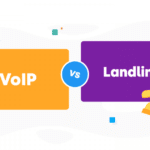Business VOIP phone system: All you need to know

Business VoIP phone system is a powerful solution that takes advantage of the Internet (instead of a landline connection), to make and receive calls. It might not seem like much, but in reality, can bring your business a lot of benefits. Here’s all you need to know about a business VoIP phone system.
There’s no doubt that business phone systems have changed over the years. Nowadays, they don’t only facilitate communication between employees, but also serve as the main tool for many customer & sales support teams. But, as their popularity is rising, so does the user expectations.
As a result, today’s business phone systems simply need to have lots in store. Providing omnichannel support to call centers, allowing the team to communicate easily, offering advanced features and integrating with other tools – are just a few examples of what’s expected of them. Luckily, modern VOIP solutions are fully capable of meeting these expectations.
What is VoIP?
Voice over Internet Protocol (VoIP) turns analog phone signals into digital ones, in order to be able to send them over an IP network. It means that you don’t need a local phone company anymore – if you have a stable Internet connection, you can use it to make and receive calls. Some people use it as an addition to their “traditional” phone service, mostly because VoIP service providers usually offer lower rates than phone companies. That’s not the only reason, though – especially for businesses.
Business VoIP aims to replace the enterprise phone systems that organizations take advantage of to connect their employees internally with each other and externally to their customers and partners. It offers a range of features that can be useful to any business out there (such as IVR, conference calling, or voicemail). Plus, employees who work remotely can easily access the enterprise VoIP system from any place and device, which also facilitates communication within the team.
For a VoIP system to function properly, though, it needs a way of routing calls between users, and outside the organization. In a cloud-based phone system, it’s possible thanks to a virtual private branch exchange (PBX).
What is the difference between PBX and VoIP? A PBX works as a switch station for telephone systems: it usually consists of a few branches, switching connections to and from them whenever needed. There’s no need to run a large PBX operation yourself – dedicated providers will take care of routing your calls, allowing you to share their PBX with other customers in exchange for a monthly fee. These capabilities are crucial if you have a large sales & support team and thus, process a lot of calls on a daily basis.
Here, you can watch our brief video guide on VoIP technology:
What else can you get out of a business VoIP phone system?
Apart from actually facilitating the calls and cutting costs, a cloud-based VoIP phone system can bring your business a lot of benefits. The most common capabilities that you should be looking into are definitely:
- Call queuing – you can have all incoming calls sorted in queues, based on predefined rules and availability of the agents,
- Call recording – you get all your calls recorded automatically, and you can access them anywhere and anytime,
- Personalized greetings & music – you can easily customize the very first thing your callers hear when they contact you and encourage them to leave a voicemail that you are able to listen to afterward (speaking of: Here’s how you can nail your after-hours voicemail greetings),
- Extensions – having personalized numbers and extensions will allow your callers to reach anyone in your company, and let you to seamlessly route a call to a different agent if needed,
- Callback – the ability to automatically contact your customers back whenever you missed their call can help you reduce call abandonment rates and boost customer satisfaction,
- Integrations – you will be able to integrate your phone system with a CRM, e-commerce solutions, or helpdesk tools to keep all relevant data in one place and serve your callers better,
- Contact history – a full overview of all customer interactions will always be within reach, including previous calls, orders, chats or notes, so there’s no need to look them up in multiple systems,
- Real-time dashboard – it allows you to monitor your call center activities in real-time, no matter how big your team is,
- Conference calls – the possibility to schedule conference calls can improve the information flow in your team and with your clients or business partners.
These are just some of the features that you can find in a powerful VoIP phone system.Actually, they are the main differentiators between VoIP and traditional phone systems – and that’s hardly surprising, given the benefits they provide. As a matter of fact, cloud-based phone systems can easily support the efforts of your customer service and sales teams.
CloudTalk is a perfect example of such a solution. It doesn’t only let you make and receive calls but also leverage the insights on your agents and calls, be it inbound or unbound. You can also integrate it with plenty of tools that you’re already using – including CRM software, helpdesk tool, or live chat, to support your contact center.
Want to see CloudTalk’s magic?

















